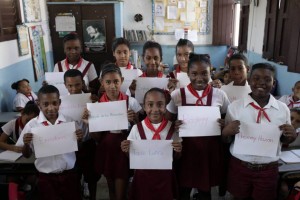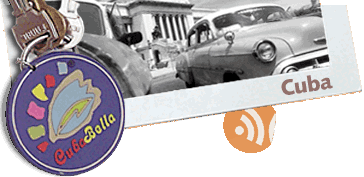Generación Y – Cuba’s oddball Y Generation of Child Names
As a resident of Havana, Cuba’s glorious capital, Yanitse Garcia has toiled for three decades correcting people on the pronunciation and spelling of her name.
So when she had her first child, Garcia naturally decided to save her daughter a lifetime of misery by choosing a simple name that everyone understand and which flows off the tongue: She called her daughter Olivia.
“What I love about Olivia is exactly that it wouldn’t be a bother for her,” remarked Garcia, a 32-year-old expert in foreign languages, with a laugh. “It sounds good in both Spanish and English, and no one will ever misspell it.”
Garcia is one of Cuba’s so-called Generation Y, the 100s of thousands of Cubans born during the Cold War whose parents turned tradition on its ear by giving them invented monikers inspired by Russian names like Yuri, Yevengy or Yulia. The phenomenon was so prevalent that blog writer Yoani Sanchez chose “Generation Y” as the title of her well-known blog; her counterpart on the cyber-ideological battlefield is a pro-government blogger and tweeter who uses the handle Yohandry Fontana.
There are however other misnomers from previous generations. Back in the 30s and 40s Cubans, especially in Havana, who saw U.S naval ships entering the harbor, latched onto U.S Navy as a moniker, naming their kids Usnavy or, a variation and misspelled Usnaby.
Now more than two decades after the fall of the Iron Curtain, Cubans are slowly returning to more traditional names for their kids, saying they believe it will better suit them personally and professionally when they grow up. More and more, names like Maria and Alejandro are replacing the likes of Yonersi, Yusleibis, Yolady, Yanaisy, Yunaisy, Yudeisi Yoleissi, Yuniesky, Yadinnis, Yilka, Yiliannes or Yamilka.
“The Y phenomenon was like a fad, a kind of indelible fashion. It was about being different and drifting away from the Spanish roots and monotony of the Pedros and the Rauls,” cited Carlos Paz Perez, a sociolinguist based at Miami Dade College and the writer of a dictionary of Cuban slang. “But now that has dissipated and there is a tendency to recover traditional names.”
In decades past, many Cuban parents named their kids after other family members or hewed to the common trait in the Spanish-speaking world of honoring the Roman Catholic saints associated with the child’s birth date.
There were only a modicum of eccentric names back then, said Uva de Aragon, a retired Cuban-American academic and writer born in 1944 in Havana. De Aragon’s own name was inspired by her grandfather, Ubaldo.
After the 1959 revolution and Cuba’s consequent self-declaration as self proclaimed atheist state, parents really started getting creative with their kids names.
“As many people stopped baptizing their children, it was no longer necessary to pick a name that was in the calendar of saints,” de Aragon said.
Creations like Vicyhoandry began creeping into state birth registries, as did names such as Daymer – a combination of Daniel and Mercedes – and backward renderings as in Airam instead of Maria. So too did curious English-language borrowings: Numerous Cubans can say with a straight face that Danger is not their middle name, but their first.
In the intervening time, Cold War Russian geopolitics also inspired names such as Katiuska, after the Russian-made Katyusha missile launchers. Other kids were called Che, Stalina or Hanoi.
However, it was the Generation Y phenomenon that was uniquely Cuban, and brought out many parents’ creative instincts. Consider the name Yotuel, a mash-up of the Spanish-language pronouns “yo,” “tu” and “el,” or “I,” “you” and “he” in English.
Y-style migrated overseas through migration to Florida and elsewhere, and many of the most famous examples are found on Major League Baseball rosters in the names of defected stars Yoenis Cespedes and Yasiel Puig.
Even though there is no public data available, experts and parents alike have noted an evident trend away from the Y-based names and, other eccentric names in recent years.
A review of one high school class list in Havana turned up a dozen unusual names – including Yanaisy, Luzaniobis, Katiuska and Dianabell – among various students. Meanwhile a first-grade class of 20 students had just two, Raicol and Nediam – apparently the English word “maiden” spelled backward.
“The trend in Cuba got out of control, it got out of hand. Names are also the image of a country and this is the image we want of Cuba?” said Aurora Camacho, a researcher at the governmental Institute of Literature and Linguistics of Cuba who called for government guidelines on the naming of children.
She’s not alone. Unconventional names have been popular elsewhere in Latin America and at times provoked a backlash.
In 2007, the Venezuelan government unsuccessfully pushed a bill that would have outlawed “names that expose (children) to ridicule, be they extravagant or of difficult pronunciation” after two children named Superman were found in the national birth registry. A similar government proposal was aborted in the Dominican Republic in 2009.
Recently, the Mexican state of Sonora prohibited 61 oddball names that had been found at least once in state registries. They included Facebook, Rambo, Circumcision, Lady Di and Juan Calzon, or, in English the unflattering, “Juan Underpants.”
In recent times, there have been numerous articles in Cuban official media warning of the need to regulate naming practices and urging parents to be thoughtful when it comes time to registering their newborns with a name for life.
However, even without the heavy hand of the government, Cubans seem to be switching back to conventional names all by themselves.




